
The
Architect:
John
Hopkins
Post University is in an unprecedented period of growth, and they're just getting warmed up on "reimagining higher ed." Meet JOHN HOPKINS – the man leading these lofty plans, and learn why Post has the potential to help transform the City of Waterbury in the process.
John Hopkins’ grandfather was a builder along the sea coast of southern New Hampshire. Come the last day of school each year, little John and his three siblings would head out to one of Grandpa’s homes and enjoy summer on the water. Dad was a builder, too. Mom, an accomplished artist.
So naturally, John wanted to be an artisan as well. An architect, to be exact. But first, a childhood dose of reality. “I was a little disappointed in an elementary school drawing that I made, and I was looking for comfort, and my father looked at it, and he said, ‘John, you can’t draw a stick.’”
In that moment, Hopkins knew that architecture probably wasn’t in the cards. What he didn’t know at the time was, he would spend nearly all of his career architecting successful enterprises.
John Hopkins is the Chief Executive Officer & President of Post University, the Waterbury-based school with a thriving on-campus and online student body. He joined the school in 2016.
Since then, Post has helped renovate the historic Howland-Hughes Building in downtown Waterbury, added a school for nursing and health sciences, and expanded its already innovative online capabilities for learners of all ages and in locations around the world. Hopkins has re-engineered Post’s admissions processes, overhauled its Information Technology infrastructure, and has sparked Post’s selection to the Best Online Programs list by U.S. News & World Report – three times – for Grad Education, Veterans Grad Education and Grad Business. It makes sense, then, that he was the recipient of the Consumer Maverick of the Year by the American Business Awards (for the third time).
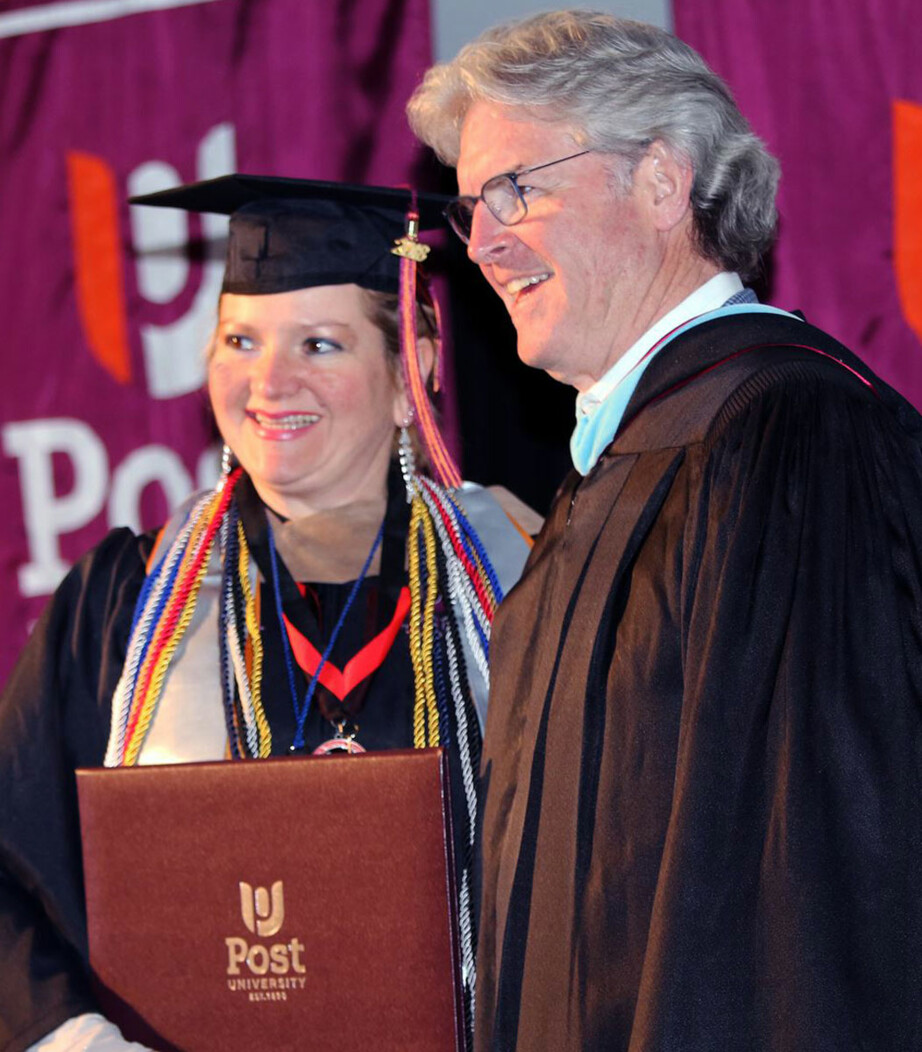 Post University
Post University By most entrepreneurial standards, this would be cause for celebration – the kind of extended self-congratulation that can lead to complacency. Luckily for Post, and for the Waterbury region, John Hopkins is unlike most entrepreneurs.
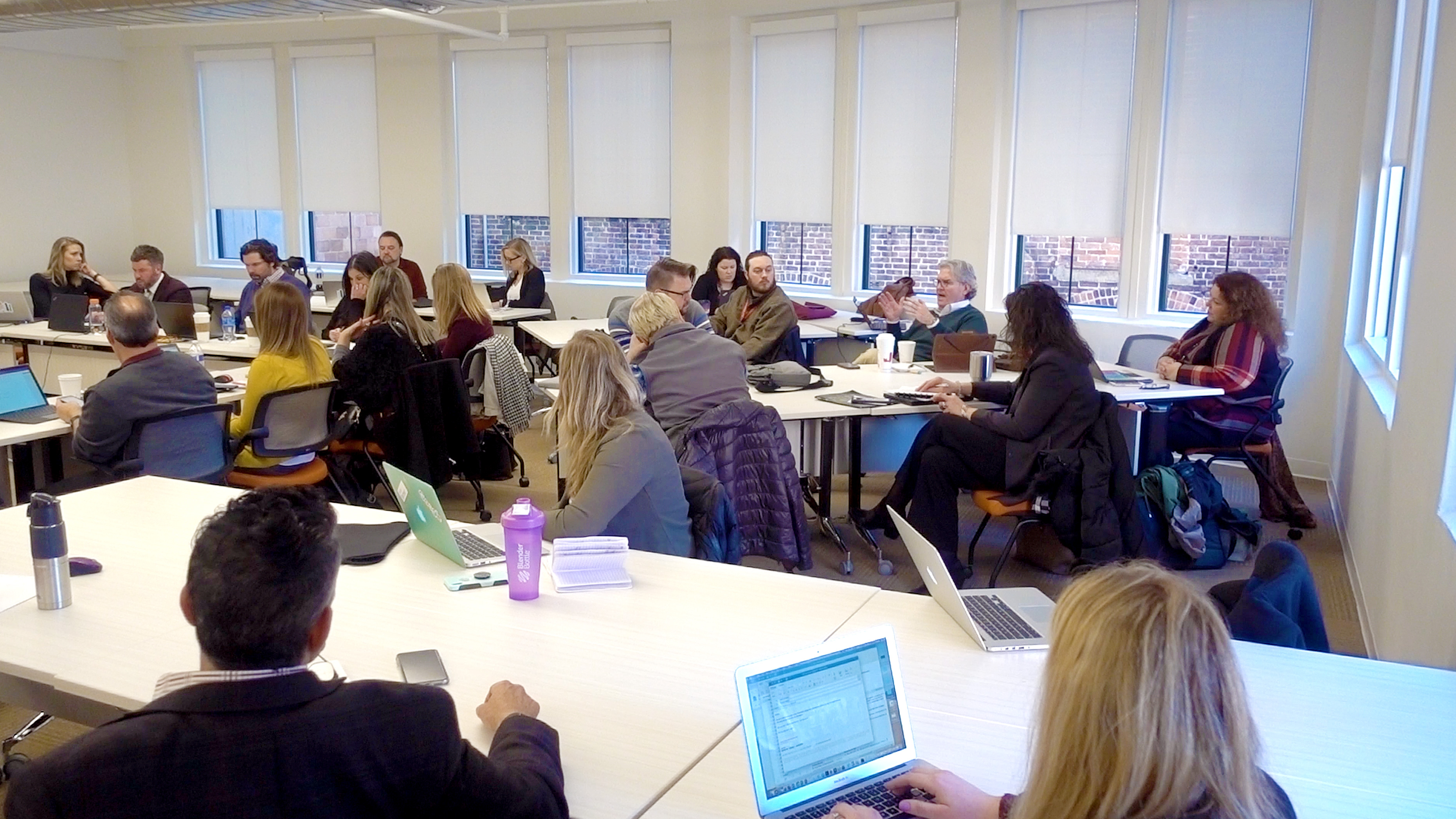 WORX
WORX For an ambitious guy who’s at the forefront of stewarding a University into an extraordinary future, John Hopkins is a bit timid about the spotlight.
Example: Over a recent 364-minute strategy session with key stakeholders and agency partners, John speaks for about nine. He never struts in the middle of the room, never advances a PowerPoint presentation he’s seeing for the first time, never laughs at his own executive jokes. It’s as if he’s just another team member – which he insists that he is. In classic self-deprecating fashion, Hopkins says, “Actually, I just go where they tell me to, and do what they want,” referring to his leadership team.
Hopkins is a perfectionist – not the my-way-or-the-highway kind, but the we’re-all-in-this-together kind.
One colleague talks, still in astonishment, about the Saturday morning before the Howland-Hughes Building opened – and finding Hopkins on hands and knees, wedged under workers’ desks, connecting new phones and computers.
And above those new workstations, woven into the beautiful exposed ceilings, are Post-branded, orange and purple data cables. It would have been easier to just make them all white, like most other cables. But that’s not how perfectionists think. (For the record, team player Hopkins credits the Post Information Technology team – not himself – for picking the orange and purple cables.)
 WORX
WORX Yes, Hopkins notices the smallest imperfections in the new building’s floor boards (and that does drive him crazy). And yes, he went through each piece of original furniture left when the Howland-Hughes – once Waterbury’s majestic shopping center – closed in 1995, to hand pick items for meticulous restoration. The department store’s original safe was one of the pieces John selected. It sits on a wood palette, a left and a right down the hall from his office, awaiting its next responsibility. Hopkins thinks it would be perfect for holding cigars and bourbon.
Details, processes and doing things yourself, matter to Hopkins. There was the morning that Rich Schechter, Chief Marketing Officer at Post, walked into Hopkins’ “under renovation” office at the Waterbury main campus, to find John’s apple cutting knife stuck into the window trim. “Um, why is that knife stuck in the window, John?,” said Schechter. Hopkins responded: “This is my apple-cutting knife. Need to keep it sharp, and I had nowhere to put it yet.”
So he plugs in other people’s computers. He assesses furniture for restoration. He cuts his own apples. Hospitality-meets-a-hunger-to-contribute. This duality makes sense when John explains his formative professional years.
[As a teenager], I can remember vividly looking through magazines and I just was so impressed by some of the commercial hotels that were being built at the time. I said, ‘Well, if I can’t design them, I’ll run them.’
 Wikipedia
Wikipedia In his mid-twenties, Hopkins worked his way up to Senior Vice President of the Peabody Hotel Group in Memphis – their eponymous hotel having opened in 1869 and long been hailed as “The South’s Grand Hotel.” By thirty, John was President of RFS Hotels – leading operations, new construction, and Profit & Loss management for a group with 32 hotels worldwide. After selling it as the first publicly-traded hotel Real Estate Investment Trust, he went on to run Omni Hotels worldwide.
Throughout his early career, Hopkins says, “I took a lot of risks because I didn’t have the experience, particularly that technical experience. So it taught me early on… it’s an expression we use even to this day... ‘At first, seek to understand, and then be understood.’ It’s important to listen to learn. But, you also have to portray some confident decision-making skills.”
Hopkins went from leading hotel groups, to leading one of the nation’s largest senior living enterprises, to leading two education-based institutions, and then, to leading Post. Upon analysis of his successes, Hopkins always seems to have had a master plan built around inspired alignment, informed cultures and progressive thoughts.
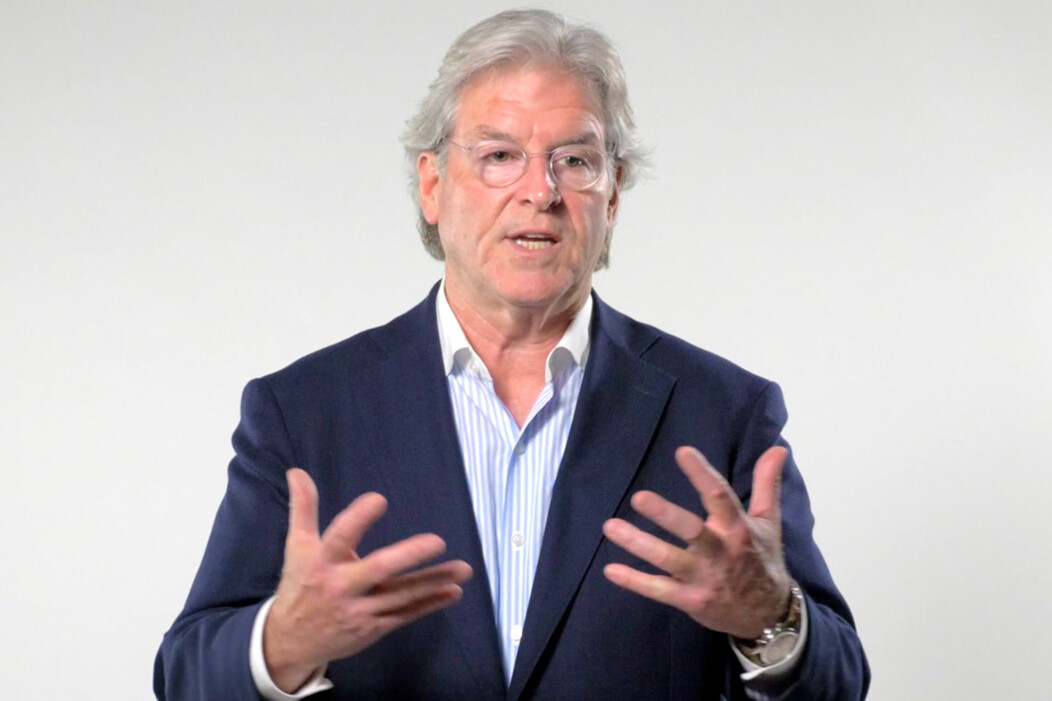 Post University
Post University To illuminate this, let’s head back to that 364-minute strategy session. As university leaders finish the third of three stellar presentations, Hopkins calmly retorts.
“It sounds like we’re taking something great, and planning to make it a little better. We need to take great, and reimagine something far beyond it. Let’s make the canvas white again. Start painting.”
Comments like that beg the question: What is the master plan for Post? And more specifically, is Hopkins trying to establish Post in Waterbury as, say, Yale has done in New Haven?
“The direct answer is yes,” answers Hopkins, “but there are a lot of caveats to that."
"The practical reality is, as the University continues to grow, the main campus is about to run out of res hall and classroom space, so there will be a time sooner than later where we’re going to have to take a hard look at all that space planning. I can see a day when there is a downtown Waterbury campus that might include some classrooms, perhaps moving graduate schools down here. Organizing that in a visionary way is the process that we’re in right now, but I can definitely see a time when there will be a bigger presence for Post. I will say, to date, the city of Waterbury has been phenomenal. Post is not going to transform Waterbury in and of itself. We’re going to continue to look at the options to grow in this immediate area, but I also hope it is the catalyst that spurs a lot of other exciting investment opportunities downtown.”
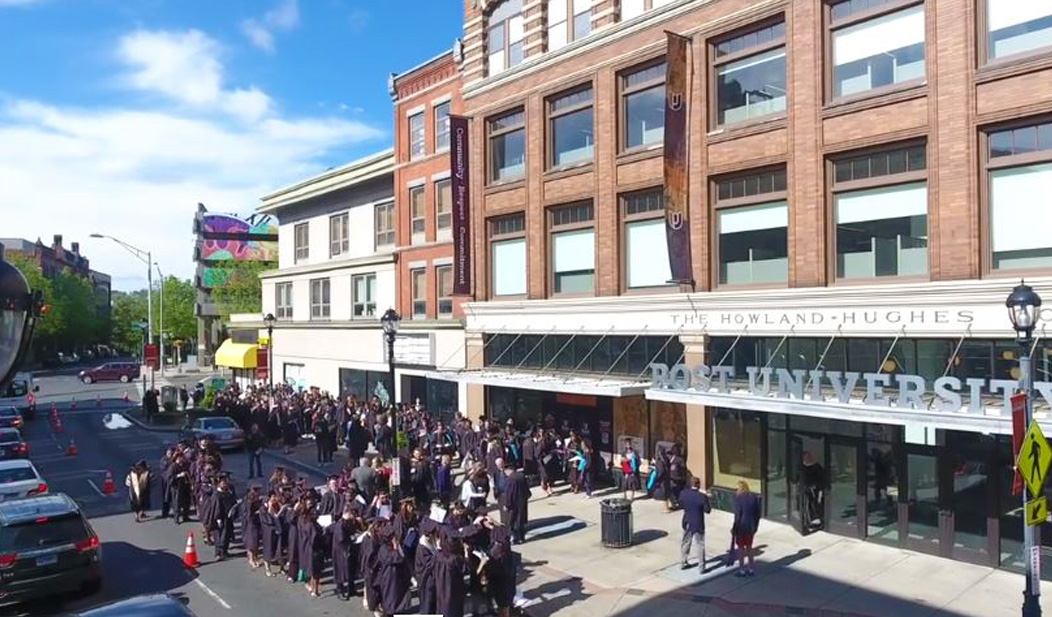 Post University
Post University Associates gather outside the Howland-Hughes Building for commencement.
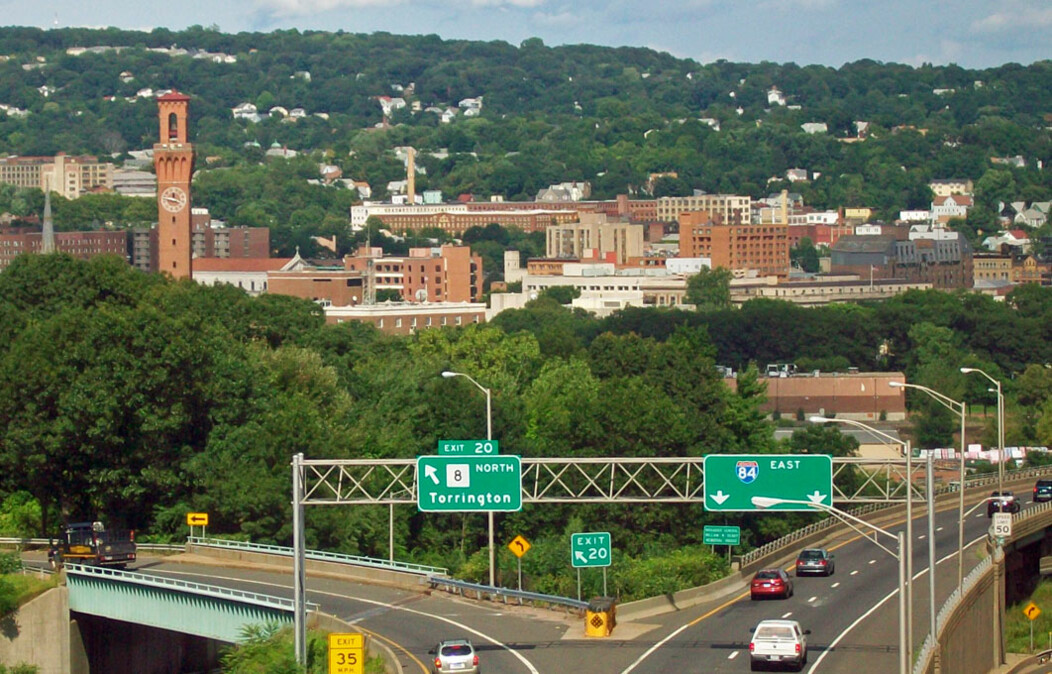
I think the possibilities are endless for a business in Waterbury.
Expounding on Waterbury, Hopkins says, “I look at Waterbury and I love the diversity of it. I love the diversity in the workforce. It’s culturally enriched, between the Palace Theater, the Mattatuck Museum, the beautiful churches… I could go on. There’s a lot going on in this town that we just have to leverage, and I clearly have now come to understand those possibilities. And, [the City] is open for very creative conversations, which is always very helpful to any developer coming into town."
"How is Waterbury perceived? We have to make that a very positive message."
"The truthful messages are going to have a profound impact on the perceptions of Waterbury. Five years from now, I hope we’re still seeing countless companies, big and small, coming into the area and working, constantly working on the infrastructure.”
Hopkins is elated to be in the middle of Waterbury’s resurgence, and says the credit bestowed upon Post should go to the faculty and staff for doing “a Herculean job” of shifting the way they work, and of personalizing the experience for each Post student.
When it is brought up that Post alumni include everyone from a member of the House of Representatives and a Harlem Globetrotter, to a Miss Connecticut and the President of Uruguay, Hopkins adds: “Whatever it might be, I hope that every Post student is successful in their careers and, as that career progresses, they turn around and look at the next person in line and help them. They can change the world… change the world."
As for Post in the future – the white canvas that Hopkins wants leaders to start painting on – John envisions a hybrid university that avoids the trappings of traditional education models.
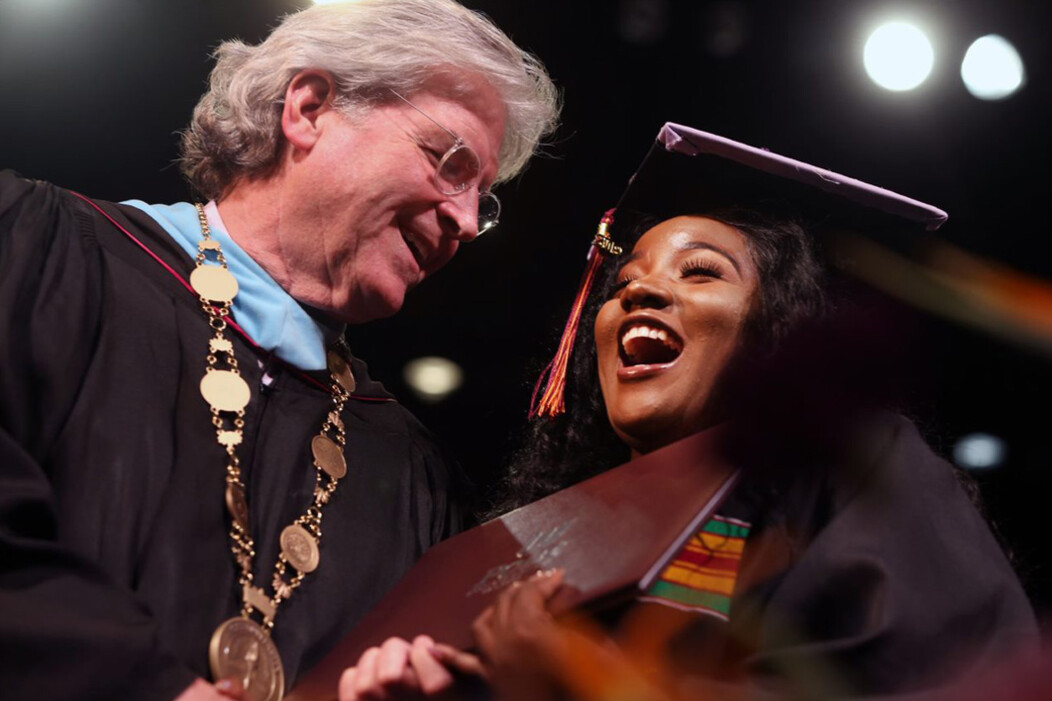 Post University
Post University
YOU EITHER CREATE CHANGE, OR CHANGE WILL CREATE YOU. RIGHT?
“I may have changed [jobs] six times in my career. [Today’s students will] probably change 12 to 18 times, and over a longer period of time. So what that means is they have to stay relevant. Because they’re constantly changing, and the pace of change in the marketplace is so rapid with technology today... I would assert that the traditional model is obsolete.”
The new model Post is building makes the University pivotal as their students pursue knowledge more continually. Because of this, Hopkins says, Post may eventually serve a student beyond their undergraduate and graduate years – possibly throughout their entire life.
For a kid who couldn’t draw a stick, John Hopkins is quite the architect.
 WORX
WORX 

